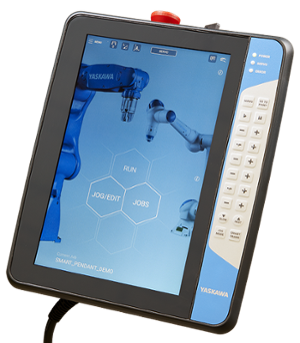These pages describe the SDK for developing extensions for use on the Yaskawa Smart Pendant - a programming pendant for Yaskawa Robots.

¶ Overview
The Smart Series robots by Yaskawa are shipped with a touch screen programming pendant - the Smart Pendant (pictured above). This SDK allows extending the pendant with custom extension 'apps'. It is targeted at software developers comfortable with Java programming and with some experience developing user interfaces.
The pendant hardware consists of an ARMhf embedded computer that runs the pendant UI independently from the real-time robot control system running on the controller (e.g. YRC1000micro). In addition to the Yaskawa developed programming interface, this SDK allows developers to create extensions for the Smart Pendant that run on the embedded computer in a Debian 9 isolated Linux container. Extensions can be implemented as stand-alone Linux executables that interact with the standard pendant UI and the robot controller via specified APIs.
The standard extension execution environment also provides OpenJDK (and later .NET 4.6) so that extensions can be developed as cross-architecture (CPU) executables so they inter-operate with future versions of the Smart Pendant platform running on other architectures. The extension API is network aware, so during development it is possible to run extension executables on a desktop computer interacting with the pendant via the network, or with a simulated pendant desktop application. Hence, developers may use the IDE with which they are most comfortable.
¶ API (Application Programming Interface)
The API is divided into two major parts - the Pendant API and the Controller API. The Pendant API contains functions related to the UI (User Interface) integration and the Controller API contains functions for interacting with the robot controller (I/O, Jobs, Variables, Motion etc.).
The API functions are specified using a language-neutral IDL (Interface Definition Language) - the Apache Thrift IDL. Thrift supports the automatic generation of client code in many programming languages, including Java, C#, C++ and Python. The SDK provides a more convenient wrapper around the generated Thrift client code for select languages (currently only Java).
¶ Execution Environment
When a packaged extension is deployed to the pendant via the user installation UI, it is deployed within a Linux container (LXC) containing a base Debian 9 ARMhf Linux environment. If specified, the container will also have OpenJDK10 installed. Additional deb packages may be installed within the container during installation, if supplied and specified in the extension package.
During development, packaging of an extension is not necessary. The extension executable may be run on any desktop with network connectivity to the pendant (or simulated pendant app) in order to connect to the API server.
¶ Packaging
For distribution, the packaging tool supplied with the SDK can be used to combine the extension executable and supporting files (data files, images, OS install packages, INFORM robot jobs, controller MotoPlus apps etc.) into a single Yaskawa Install Package (.yip). This can be distributed to end-users, who can place it on a USB drive and insert into the pendant for installation. Internet connected Smart Pendant apps will be able to install packages from the web in future.
¶ Quick Start
Developing a simple Java extension
¶ Concepts
Introduction to Variables, I/O, Tools, Zones and User-Frames
¶ YML
¶ Example Extensions
¶ HOW-TOs
- Packaging Android extensions
- Dynamically working with YML properties
- Reading and writing I/O
- Programmatically insert robot job commands
- Create tool property presets
- Add Help Information Popups
- Translation and Localization
¶ Packaging and Installation
¶ Reference
Thrift IDL API Definition Source
(including doc comments)
¶ Support
The SDK API and libraries are Open Source and openly developed on GitHub.
The best support for the SDK is through the community of developers who have experience using and developing it. Head over to the Robotics Stack Exchange to ask (and answer) questions. Be sure to tag your questions with smartpendant and/or yaskawa.
If you find bugs or have feature requests for the SDK, please create a new Issue.
For general support with Yaskawa Motoman Robotics products, contact support for your region. (Direct US Support link)